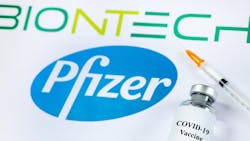Pfizer’s COVID-19 Vaccine Now Fully Approved by FDA
The Food and Drug Administration announced Monday, August 23 that the Pfizer-BioNTech COVID-19 Vaccine has met all the requirements for full FDA approval for those 16 and older. It is the first COVID-19 vaccine to achieve full, and not just emergency-use, approval.
The Pfizer-BioNTech COVID shot will now be marketed as Comirnaty.
Acting FDA Commissioner Janet Woodcock called the full approval a “milestone” for confronting the COVID-19 pandemic, noting that while it and other vaccines had already been approved for emergency use, the full approval “may now instill additional confidence to get vaccinated.”
“The public can be very confident that this vaccine meets the high standards for safety, effectiveness, and manufacturing quality the FDA requires of an approved product,” said Woodcock. Pfizer CEO Albert Bourla, in a statement, echoed the hope that full approval would increase public confidence in the vaccine.
The FDA said the full approval was based on the same clinical trial information used for its emergency use authorization, as well as additional data collected since then. Clinical trials involving about 40,000 people, roughly half of whom received the vaccine and half of whom received a placebo, determined the drug is 91% effective at preventing COVID-19.
The shot can increase the risk of two kinds of heart inflammation for about a week after the second dose is administered, the FDA said, though the increased risk is minor and those who experience it usually see their symptoms resolve.
The Pfizer-BioNTech vaccine was also the first COVID-19 vaccine to achieve emergency-use approval by the FDA, which it received in December 2020. While the original emergency-use authorization has since been expanded to apply to those between 12 and 15 years old, the full approval currently only applies to people older than 16.
According to the Associated Press, the full approval is likely to make employer vaccine mandates easier to apply and therefore more likely. In July, IndustryWeek contributors from the Labor and Employment group at Robinson+Cole noted that instituting a vaccine mandate for a drug that hasn’t been fully approved by the FDA is legally riskier.
Despite that risk, major manufacturers Tyson Foods, Inc. and Microsoft, Inc. have already announced they will mandate that employees and new hires without religious or medical exemptions receive the vaccine.
About the Author
Ryan Secard
Associate Editor
Ryan Secard joined Endeavor B2B in 2020 as a news editor for IndustryWeek. He currently contributes to IW, American Machinist, Foundry Management & Technology, and Plant Services on breaking manufacturing news, new products, plant openings and closures, and labor issues in manufacturing.
